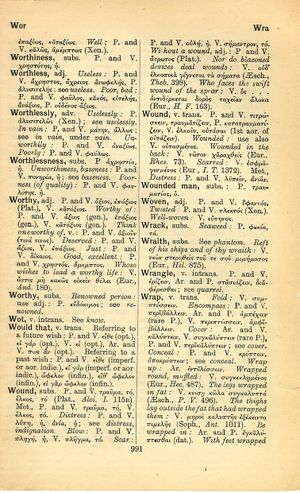would that: Difference between revisions
From LSJ
Δίκαιον εὖ πράττοντα μεμνῆσθαι θεοῦ → Die tuenda memoria in rebus bonis → Wenn es dir gut geht, denk an Gott, dies ist gerecht
(CSV5) |
m (Woodhouse1 replacement) |
||
| Line 1: | Line 1: | ||
{{Woodhouse1 | {{Woodhouse1 | ||
|Text=[[File:woodhouse_991.jpg|thumb|link={{filepath:woodhouse_991.jpg}}]] | |Text=[[File:woodhouse_991.jpg|thumb|link={{filepath:woodhouse_991.jpg}}]] | ||
===verb transitive=== | |||
[[refering to a future wish]]: [[prose|P.]] and [[verse|V.]] [[εἴθε]] (opt.), [[εἰ γάρ]] (opt.), [[verse|V.]] εἰ (opt.). [[Aristophanes|Ar.]] and [[verse|V.]] [[πῶς]] ἄν (opt.). | |||
[[referring to a past wish]]: [[prose|P.]] and [[verse|V.]] [[εἴθε]] (imperf. or aor. indic.). [[εἰ γάρ]] (imperf. or aor. indic.), [[ὤφελον]] (infin.), [[εἴθ' ὤφελον]] (infin.), [[εἰ γὰρ ὤφελον]] (infin.). | |||
}} | }} | ||
Revision as of 08:54, 20 May 2020
English > Greek (Woodhouse)
verb transitive
refering to a future wish: P. and V. εἴθε (opt.), εἰ γάρ (opt.), V. εἰ (opt.). Ar. and V. πῶς ἄν (opt.).
referring to a past wish: P. and V. εἴθε (imperf. or aor. indic.). εἰ γάρ (imperf. or aor. indic.), ὤφελον (infin.), εἴθ' ὤφελον (infin.), εἰ γὰρ ὤφελον (infin.).

